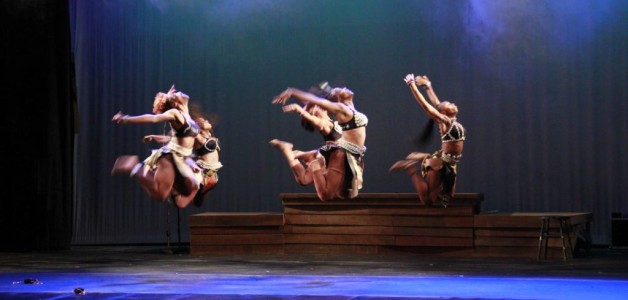GIWAYEN MATA is the award-winning, dynamic, soul-stirring, all-sistah, dance, percussion, and vocal ensemble that celebrates the richness of traditional Afrika by exhibiting its exemplary art forms. The ensemble performs traditional, contemporary and original pieces that address issues pertaining to people of color, women, and the environment. The seed for the ensemble was planted in 1991 when Ramatu Afegbua Mahmud Sabbatt organized sistahs for jam sessions in city parks of Atlanta. This was done in the spirit of the principles of Kuumba and Kujichagulia (Kiswahili words for creativity and self-determination).
This experience allowed many of the participating women to hone their respective talents either individually or with performing companies. In 1993, GIWAYEN MATA was formed in response to a call to Gail Vernon Zuri Sami Ra Maati Jordan from Amirah Wazir, the coordinator for Celebration ’93, an annual fundraising fashion show and Mother’s Day celebration sponsored by the women of the Atlanta Mas-jid Al Islam. Amirah was seeking an all-female entertainment group.
At Zuri’s request, Omelika Kuumba brought together eight of the other women from the jam sessions: Osunlade Fatunmise, Sarahn Henderson, Ife Hendricks, Sauda Jackson-Bey, Shalewa Mackall, Andrea Richards, Ramatu Sabbatt, and Ama Tyus. While rehearsing for Celebration ’93, the ensemble sought a name that would embrace the spirit and principles with which it was seeded.
Ramatu, a native of Nigeria, shared the Hausa term GIWAYEN MATA with the ensemble. The words literally translate as “Elephant Women”. Elephants live in matriarchal social structures, and the females are respected for their powerful yet gentle and nurturing nature. Leaders of women’s organizations in Nigeria are referred to as “the GIWAYEN MATA”. This became the selected name and it is interpreted as “Elephant Leaders of Women” because the founders chose to be trailblazers, playing the jembe drum – an unprecedented first on the stages of Atlanta. As artists of Afrikan descent, the ensemble felt a responsibility to be the leaders in the preservation of the cultures of Afrika and the Afrikan Diaspora.
Under the direction of Omelika Kuumba and with the choreography of Ife Hendricks, these ten vibrant women prepared for the performance. The preparation schedule expectations were exceeded and the women demonstrated a spectacular debut concert, opening for New York’s Women of the Calabash at Spelman College’s Sisters Chapel months before the performance for which the ensemble had originally come together. Hailing from the US, Haiti, Senegal, and Ghana, GIWAYEN MATA represents women of international origins at various stages of womanhood. Collectively, they share more than 50 years of experience in modern, jazz, ballet, contemporary, Afrikan, Afrikan-American, and Caribbean dance forms, and sign language. Their backgrounds reflect multidisciplinary experiences as dancers, percussionists, choreographers, vocalists, thespians, poets, academicians, and lyricists.
As women of color GIWAYEN MATA represents the groups of people from whom the art forms originated. Pamelah Maragh brought technical expertise to the group. It was her contributions that took the ensemble to the next level of performance. Through Pamela, GIWAYEN MATA began to create full-length productions complete with lighting designs. The first production under Pamelah’s technical direction was Rising to Our Power, the ensemble’s celebration of Women’s History Month. As “Elephant Leaders of Women” the ensemble uplifts audiences with riveting performances that are empowering, educational, enlightening and entertaining

